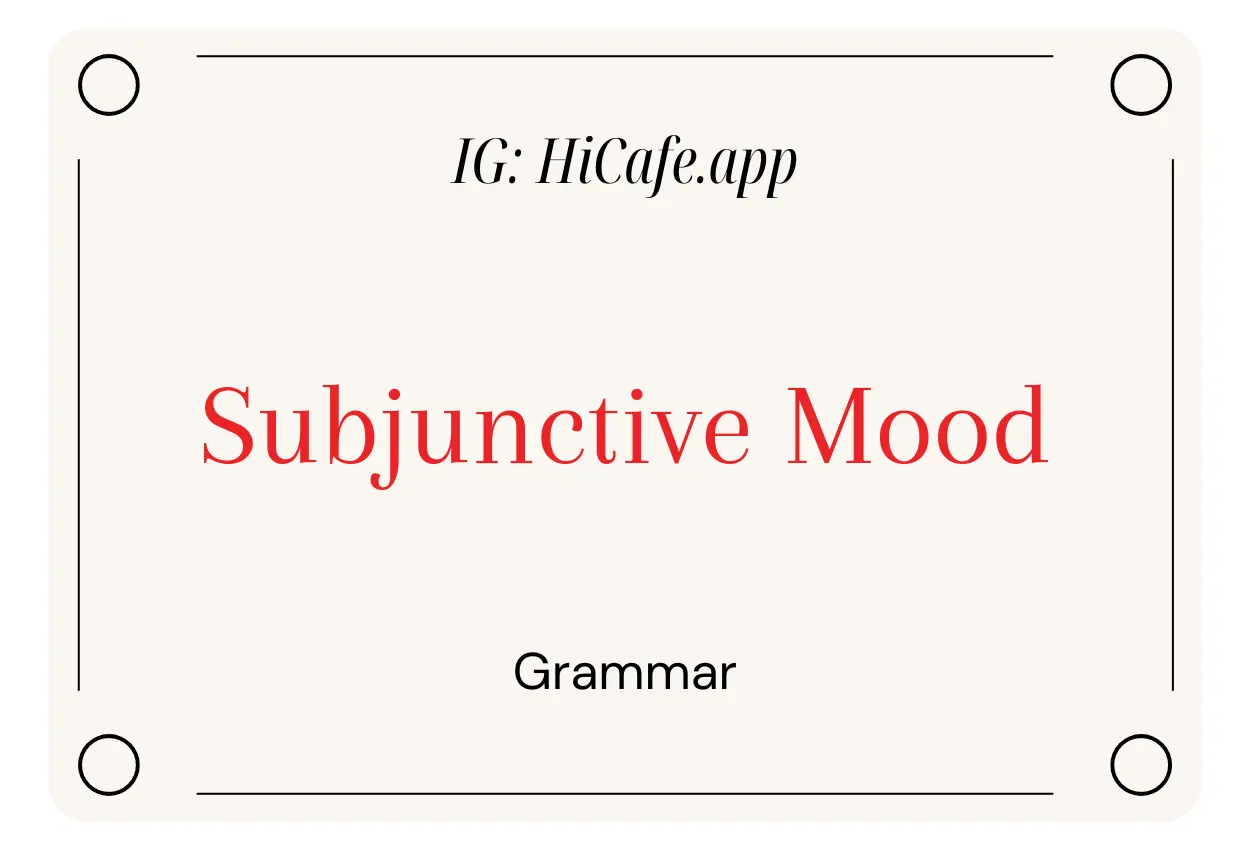Grammar Level 6- Lesson 23- Subjunctive Mood Grammar
In this grammar lesson, you learn about Subjunctive Mood grammar in English and how to use it in your English conversation and writing. Just follow examples and write them down a few times to learn them very well. After finishing this lesson, you should work on its quiz.
Grammar Recap
In our previous lesson, we covered the Have To Question Words If you just landed on this page, we suggest that you complete our previous lesson including its quizzes before continuing on this lesson.
Requirement Lessons
There is no required lessons for working and learning this lesson.
Examples of Subjunctive Mood
The subjunctive mood has a very unusual affect on verbs in a sentence. When we studied conditional sentences in grammar Level 4 Lessons 12 – 14, you noticed this same strange affect. That’s because the subjunctive mood and conditional sentences share some of the same qualities. Some teachers would even say they are the same thing.
You can use the subjunctive mood after verbs that request or ask, such as suggest, recommend, request, ask, require, demand, insist
What these verbs (and others not listed) have in common is that someone is asking you to do something.
This is what the verb “be” looks like in the subjunctive mood when these verbs–suggest, recommend, request, ask, require, demand, insist–come before it:
singular
I be
You be
He be
She be
It be
plural
We be
You be
They be
The teacher asks that we be on time.
I recommend that you be at the airport before 9:00 a.m.
Tom demands that his daughter be home before 11 p.m.
Our supervisor is demanding that we be available to work next weekend.
Strange, isn’t it? But for a native speaker, it’s sounds okay. Using the simple form of the verb in this type of sentence applies to other verbs as well:
singular
I go
You go
He go
She go
It go
plural
We go
You go
They go
Our coach demands that we go to bed early on the day before the big match.
The scholarship committee requires that he go to a college that is within the state of Minnesota.
If you must leave class early, I ask that you go quietly.
The present subjunctive is almost the same as the present conditional that you learned about in Lesson Thirteen. These kinds of sentences usually use “if” or “wish.”
If I were rich, I would give more money to charity.
I wish I were rich.
In both sentences, I am not rich. This is the situation now, but the verb “be” is in the past tense. You’ll also notice that the verb “be” doesn’t seem to match the subject. Here’s yet another strange thing about the subjunctive mood. Take note of how the verb “be” is conjugated in the present subjunctive:
singular
I were
You were
He were
She were
It were
plural
We were
You were
They were
All the other verbs–regular or irregular–take the past tense in the present subjunctive but only the verb “be” seems to violate the rules of subject-verb agreement. Let’s look at a few more verbs:
If she had time, she would go to the party.
She wishes she had the time.
(She doesn’t have time now, so she isn’t going to the party.)
If they didn’t need the help, they wouldn’t ask for it.
(Do they need help? Yes. That’s why they are asking for it.)
He wishes he didn’t have to leave.
(Does he have to leave? Yes. But he would rather stay.)
Practice:
Make sentences in the subjunctive mood using the information that is available to you:
Example: He isn’t late. He doesn’t need to talk to the teacher after class.
Answer: If he were late, he would need to talk to the teacher after class.
1. I’m a teacher. I’m not a farmer.
______________________________________________________.
2. She isn’t angry. She isn’t saying anything.
______________________________________________________.
3. He doesn’t have a car. He can’t drive.
______________________________________________________.
4. The students don’t need books. They don’t need to ask for them.
______________________________________________________.
5. It isn’t raining. We don’t need to go inside.
_______________________________________________________.
Answers:
1. If I weren’t a teacher, I would be a farmer.
2. If she were angry, she would say something.
3. If he had a car, he could drive.
4. If the students needed books, they would ask for them.
5. If it were raining, we would need to go inside.
Quiz for Subjunctive Mood
Now that you learned your new lesson, it is time to go to the Subjunctive Mood page and finish your quiz. While working on your quiz, you can always go back to its lesson to refresh your memory.
Private Lessons in English
If you need help with quizzes of this lesson, you can hire one of our expert private English teachers by going to our Private English Tutoring page and submit a request. When submitting your request, make sure to mention the grammar level and lesson number.
Next Grammar Lesson
In our next lesson, we will cover the Appositives Grammar Before moving to the next lesson, we suggest that you complete this lesson including its quizzes.
Related Grammar Lessons
None
Grammar Level 6 Outline
If you wish to explore all lessons that are covered in HiCafe Grammar Level 6, you can visit the Grammar Level 6 Outline page.
Practice English Grammar Skills
For a comprehensive practice of English grammar with quizzes, you can visit the Improve English Grammar Skills page to view HiCafe 250 grammar lessons in 7 levels plus prepositions and pronouns.



